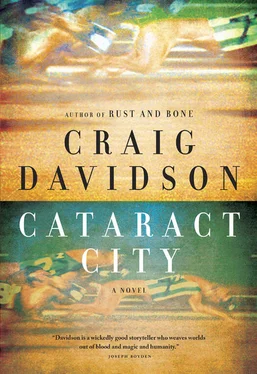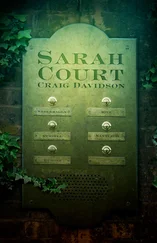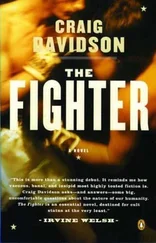The first seven years of my life, my father worked on the Nilla Wafers line. I don’t know what he did beyond that. When you’re a kid all you know is that your dad puts on his suit or overalls and vanishes from your life until nightfall. Sometimes my pops came back exhausted and scarlet-eyed, as if he’d been engaged in a low-wattage war someplace. If you asked how work was he might say: “Work’s work.” Unless your dad was an astronaut or a cowboy — and nobody’s dad in Cataract City had a gig like that — whatever he did for those hours held slim appeal.
Dunk’s father worked at the Bisk, too. Chips Ahoy line. Our dads carried the smell of their lines back home with them. It became a forever quality of their clothes. It crept under their skin and perfumed the sweat coming from their pores. I used to keep score at the Bisk’s company softball games; after a while I knew the batting order by smell alone: first up was Triscuits, second was Fig Newtons, third was Cheese Nips. The mighty Nutter Butter batted cleanup.
My father wasn’t ambitious by nature — a more aww, shucks man you would not meet — but he was willing to work his ass off, had a supportive wife and a working-class chip on his shoulder. That chip was a familiar accessory on a lot of Cataract City men, but unlike other guys my dad didn’t nurse his grudge impotently over beers at the Double Diamond. He looked at the men above him— literally : at the Bisk, management offices were glassed-in boxes overlooking the factory floor — and said to himself: Why not me?
He studied nights and by the time I was eleven he’d earned a business degree. He rolled this into a job as line supervisor, which led to a promotion to day-shift super.
Years later I asked him why he worked so hard to get that degree. He said: “I didn’t want to smell like a Nilla Wafer in my coffin.”
I wasn’t a popular kid. I wasn’t popular at any age, but in elementary school I’m not sure it mattered. The schoolyard hierarchy hadn’t quite solidified. If anything, I was human wallpaper during those years. Whenever I grafted onto the edge of some group I’d get looks that said: Oh, Dutchie — how long have you been standing there? I was such a non-entity that I wasn’t even teased.
On my report cards teachers wrote: Dutchie seems quite thoughtful . They didn’t mean I was selfless — more that I often appeared to be absorbed in thought. Which wasn’t really true. I had very little to say was all.
I first met Duncan Diggs when I was ten. We both lived on Rickard Street and went to the same school but had never spoken before. Dunk shared my loner spirit; he usually haunted the edge of the schoolyard by the tetherball poles in a jean jacket covered with iron-on rocker patches.
The day we met I’d been walking across the soccer field at recess when Clyde Hillicker tackled me from behind. Hillicker was a big dumb kid who’d grow up into a big dumb man, but at the time he was just puppy-clumsy and outweighed me by forty pounds. His fingertips were always stained Freezie-orange.
I crashed down with Clyde on top. My face hit the ground and my teeth gritted on a plug of dirt dug up by the aerator machine.
“Just lay there, Dutchie, okay?” Clyde said, all chummy. “I want to show Adam something.”
He was with his friend Adam Lowery, an anorexic-looking boy with a ginger bowl-cut. Clyde sat on my back and grabbed at my helplessly kicking legs.
“Don’t move,” he whined, as if I was ruining his good time.
“Get off !”
“Hammer him,” Adam said. “Hammer his face off!”
Clyde refused. “Bruiser Mahoney never punches. Bruiser Mahoney doesn’t need to punch.”
He grabbed my feet and tucked my ankles under his armpits. I lay face down with my body bent like a fish hook. A textbook Boston crab. Naturally, I screamed.
“Give up?” Clyde said.
“ Yes!”
“He’s still fighting!” Adam hollered.
“Are you still fighting?” Clyde asked.
“ No! ”
“Get off him!”
This was Duncan. He shoulder-checked Clyde hard enough that Clyde landed on his hands and knees, scraping up his palms. I gasped and curled up like a potato bug.
Clyde held his bloodied palms out to Dunk as if he was displaying stigmata. “We were just playing,” he said. Dunk shrugged and kept his body in front of mine.
“We were just plaaayin ’,” Adam said in a singsong voice. “Come on, Clyde. These babies don’t know how to have fun.”
After they left Dunk didn’t help me up, just hovered over me the way a lion does over a dead antelope. I dragged myself up and inspected the grass stains on my knees.
“Jeez. Mom’s going to kill me.” I didn’t say thanks. Was this something you thanked a person for? “You like Twisted Sister?” I said, pointing to a patch on his jean jacket.
“It’s my brother’s old jacket. A hand-me-down.”
“Cool.”
I couldn’t tell if he was amused or figured I was a shithead for thinking his twice-used clothes, which he probably hated, were cool. His T-shirt was old and there were holes along the hem as if mice had nibbled it.
Even though we were too young to have sorted out the true tough guys in the pack, Dunk struck me as someone you didn’t want to tangle with. He wasn’t big or strong. If anything, he was a bit skinny. But something in his eyes said whatever you started, he’d finish. Even if it took all day and left him a mess, he’d keep coming at you.
He was handsome, or at least he would grow to be, and his mom let him wear his hair long. It swept off the side of his skull in dark wings.
“Did it hurt?” he said.
“Yeah,” I said. “Clyde’s real fat.”
Dunk laughed. “You’re lucky. If Clyde put that Boston crab on the way Bruiser Mahoney does, you’d be dog meat.”
“Who’s Bruiser Mahoney?”
“Bruiser Mahoney ,” he said, like I must not have heard.
I just stared.
“Oh my god ,” he said solemnly, his tone that of a doctor who’d diagnosed my rare affliction: terminal idiocy. “Come to my house after school.”
That afternoon I followed him home. He took me to the room he shared with his brother and showed me the faded poster on his wall.
That was all it took for me to become enraptured with Bruiser Mahoney. It was also all it took for me and Dunk to become friends.
Inseparable. That was me and Dunk. We’d both been looking for a person whose company we preferred to our own and once we finally found that person we practically lived in each other’s pockets.
We’d have sleepovers, even on weeknights. Our parents, who’d likely been worried we’d go our whole childhoods friendless, indulged us.
I often ate breakfast at Dunk’s house, even though his mom bought powdered milk that tasted like wallpaper paste. At our house we drank whole milk and ate real Corn Flakes. At Dunk’s house we’d eat cereal that came in a bright yellow box with “Corn Toasties” stamped on the label.
We’d stay up late in my basement reading comics. On Friday nights we watched the Baby Blue Movie on Citytv. These were usually in a foreign language where the men rolled their r ’s and the women smoked stubby black cigarettes. On the upside, the women were often naked while they smoked. Or if not smoking, they were running around medieval castles with their apple-shaped asses hanging out. The point of any Baby Blue Movie, so far as I could tell, was to leave preteens all over Cataract City confused and slightly sweaty.
One kid who watched the Baby Blue Movie religiously was Sam Bovine. His last name was Italian, pronounced Boh-vee-neh , but everyone called him Bovine like the cow. A skinny boy with thin wrists and a too-big head for his body, for a while Bovine was best known as the Hair Lice Kid. Twice a year we’d all line up at the front of class while a Rubenesque nurse picked through our hair with a pair of sterilized chopsticks — and she’d always find them wriggling in Bovine’s hair.
Читать дальше












